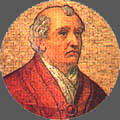 With the accession of Benedict VIII, the house of Tusculum
mounts the papal throne. This family, like that of Crescentius, was a branch of
the house of Theophylactus which had so frequently dominated Rome in the past
century. Now in 1012 the Tusculan branch of the family prevailed over the
Crescentian.
With the accession of Benedict VIII, the house of Tusculum
mounts the papal throne. This family, like that of Crescentius, was a branch of
the house of Theophylactus which had so frequently dominated Rome in the past
century. Now in 1012 the Tusculan branch of the family prevailed over the
Crescentian.
Theophylactus, one son of Gregory, count of Tusculum, became
Pope Benedict VIII; Romanus, another son, was made senator of all the Romans.
The election of Theophylactus was disputed by a certain Gregory. Unable to
prevail at Rome, Gregory fled to Henry II for help, but Henry recognized
Benedict VIII.
Benedict VIII proved to be an excellent ruler both in spiritual
and temporal matters. He welcomed Henry to Italy and on February 14, 1014, he
crowned Henry emperor. Benedict's relations with the saintly ruler were always
cordial. Benedict quickly showed that he was a strong man who would brook no
disobedience from turbulent lords. Crescentius, a cousin of the late Patrician,
had seized a castle belonging to the monastery of Farfa. The monks had appealed
to Henry and the Emperor asked the Pope to see that justice was done.
Crescentius mocked the Pope's invitation to do justice, but when he found
Benedict coming after him with an army, he agreed to be reasonable. In tackling
the Saracen menace Pope Benedict showed vigorous and competent leadership.
The Saracens had seized Luna in Tuscany and from this base were
spreading misery over the land. Benedict attacked them by land and by sea and
drove them out of Italy. Furious, the Moslem chief sent the Pope a bag of
chestnuts with the threat that he would be back the next summer with a soldier
for every chestnut. Benedict, not to be outdone in this war of nerves, sent the
Moslem a bag of rice with the warning that he when he came would find a soldier
for every grain of rice! The Pope was better than his word. Believing that the
best defense is a good offense, Benedict succeeded in getting the Genoese and
Pisans to sail against Sardinia, the Moslem base. The combined Heets captured
the island. This was a great Christian victory, for the Moslems had held
Sardinia for over a century.
Benedict also opposed the aggression of the Eastern Empire in
Southern Italy. He made allies of some adventurous Normans, and finally went to
Germany to warn Emperor Henry of the danger. While there he consecrated the
cathedral of Bamberg and visited the famous monastery of Fulda. Henry gave the
Pope a confirmation of the donation of Charlemagne and Otto. Then coming down
into Italy, he checked the Greeks. Though much occupied with temporal matters,
Benedict also vigorously acted in spiritual matters. He held a Council at Pavia
in 1018 which legislated against the prevailing abuses of simony and clerical
marriage. The holy Emperor worked closely with the Pope in his reform efforts.
Benedict also encouraged the Truce of God, that interesting attempt to limit the
private wars of that turbulent period. He also encouraged the Cluniac reform
which was still working quietly toward a better day.
Benedict VIII died on April 7, 1028. The first of the Tusculan
popes had been a good one.
Excerpted from "Popes
Through the Ages" by Joseph Brusher, S.J.

